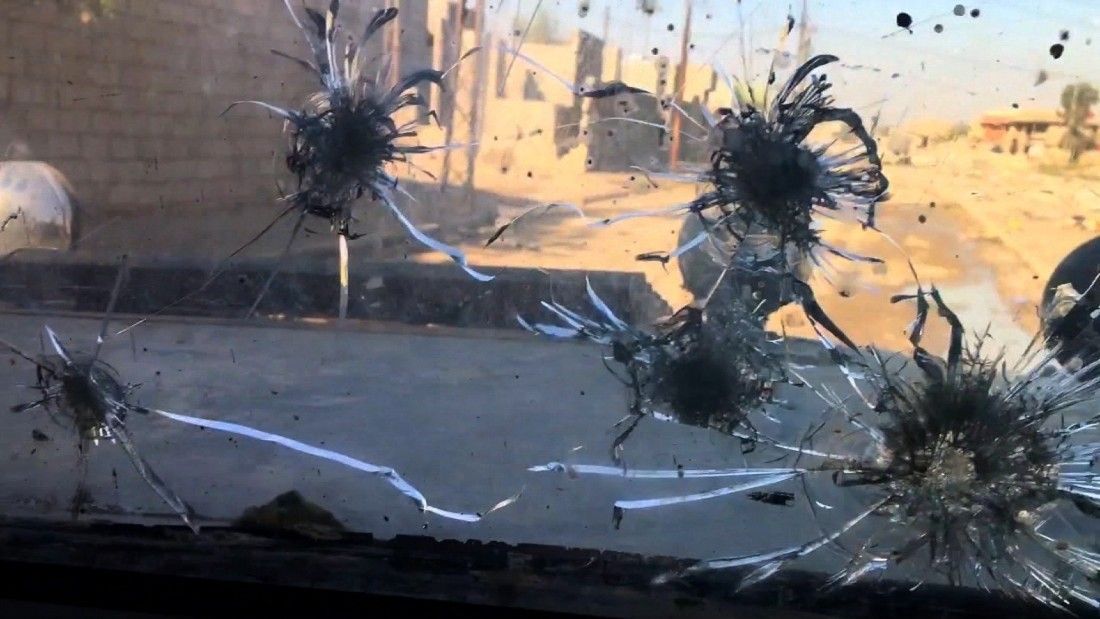Ex-Bush administration officials with pro-Trump leanings have forged a secret alliance with a former private Iraqi Pentagon contractor who is a member of one of Iraq’s wealthiest dynasties.
Their mission is to promote the break-up of Iraq as the only viable way to defeat the Islamic State (ISIS). They have achieved partial success: on Monday, the Trump administration announced a subtle but seismic shift in US policy toward the possibility of Iraq’s dissolution.
Yet this network has been intimately connected to Cambridge Analytica (the technology firm that ran Trump’s election campaign), entities that have sponsored ISIS and other Islamist militants, as well as to ExxonMobil and the Koch brothers — who might benefit from the break-up of the country.
If you want an inside glimpse into how Deep State 2.0 under Trump is working, this is it. It’s all about networks of influence, vested interests, and manipulation of public opinion: in the US and Iraq, in particular. But it’s also about oil and raw materials— and how in some ways, sectarian tensions represent only the surface of deeper drivers of conflict.
By perusing documents, speaking to sources, and digging into obscure public records, INSURGE intelligence was able to follow a thread that has so far been only been guessed at: what is driving the Trump administration’s thinking on Iraq, a country we invaded and occupied in 2003, and where we’re still fighting an endless ‘war on terror’?
A window into the answer comes from a little-known US-Iraqi network, operating through the front of a supposedly patriotic American campaign group.
The network was active through the latter half of 2016, coinciding with the final stages of US presidential campaigning, and focused on opposing President Obama’s Iraq policy.
The locus of the activity is an organization called the Committee to Destroy ISIS, set up in July 2016 by Sam Patten.
Patten served in the George W. Bush administration as a senior State Department advisor from 2008 to 2009, and previously was Bush’s presidential campaign coordinator in 2000.

He is executive director of the Committee, which describes itself as a group of Americans and Iraqis campaigning for the western Sunni region of Iraq to achieve independence from the central government in Baghdad.
In October 2016, Patten’s Committee to Destroy ISIS provided financial support to the Hudson Institute, a conservative Washington DC think-tank with direct ties to the Trump transition team, to produce a report which calls for the break-up of Iraq along sectarian lines.
The curious implications of the connection between Patten and the Hudson Institute report were first highlighted in October 2016 by Ali Hadi al-Musawi for 1001IraqiThoughts.
The report, West Iraq: The Search for Leaders and Leverage, describes itself as a ‘feasibility study’ of western Iraq becoming an independent or autonomous Sunni statelet. The proposal would end up giving neighbouring Saudi Arabia significant influence on the envisaged statelet.
The idea of breaking up Iraq is not new. It was, according to high-level sources in Jordan, actively discussed by Bush administration officials based on a vague plan brokered by Vice President Dick Cheney and Deputy Defence Secretary Paul Wolfowitz, a year before the 2003 invasion. Officials talked about engineering the sectarian partition of Iraq into three autonomous cantons for Sunnis, Kurds and Shi’as. This would, it was envisaged, make it easier for the US to control the country and access the oil-rich regions.
The plan never left the drawing board, but the strategic thinking behind it lingered and continued to surface in neoconservative planning for the future of the Middle East. This neoconservative thinking seeped across party political lines, and reared its head repeatedly among Democrats. In 2006, Joe Biden, as the senior Democrat on the Senate Foreign Relations Subcommittee, advocated splitting Iraq into three along sectarian divisions. Since then, pundits and policymakers have circulated the idea.
But the US government never formally adopted it as even a potential scenario — until now.
The lead author of the Hudson Institute report is Michael Pregent, with research assistance provided by Kevin Truitte. Pregent is a former intelligence adviser to General David Petraeus who served in Iraq and heads up a separate campaign group known as Veterans Against The Deal (VATD), set-up to oppose the nuclear deal with Iran brokered by the Obama administration.
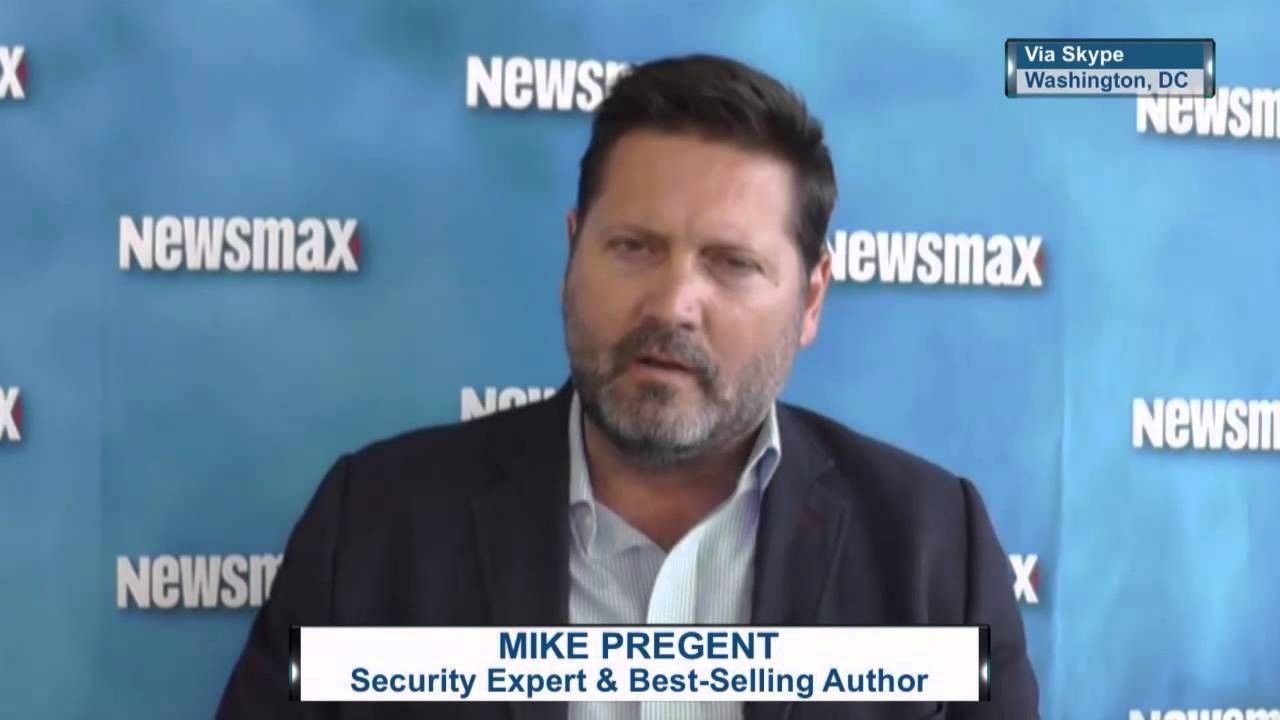
VATD launched in late 2015 with a million-dollar ad campaign against the Iran deal, claiming it would give Iran billions of dollars to fund terrorism in the Middle East. But the group did not disclose its donors.
To be sure, Iran has played an increasingly abysmal role in escalating atrocities in Iraq and Syria, fueling anti-Sunni sectarianism and, in turn, emboldening anti-Shi’a extremists. Yet conversely, Michael Pregent and his backers appear to have a curious blindspot on the role of Turkey and the Gulf kingdoms in supporting extremists linked to al-Qaeda and ISIS.
The Koch-Bush-Trump nexus
At its launch, VATD’s board members included Pete Hegseth, CEO of another pro-Republican campaign group, Concerned Veterans for America. Hegseth’s group was financed almost entirely by the Koch brothers’ $400 million political donor network.
A year later, Hegseth met with Donald Trump as a potential candidate for the post of Secretary of Veterans Affairs. He didn’t get the job. But Michael Flynn, Trump’s one-time National Security Advisor (before his untimely resignation in February) was also previously an advisor to VATD.
VATD’s PR campaign was run by a Washington DC PR firm, Javelin DC, founded by Matt Latimer, President George W. Bush’s deputy director of speechwriting and chief speechwriter to former defence secretary Donald Rumsfeld. Javelin’s co-founding partner is Keith Urbahn, who served as Rumsfeld’s chief of staff.
VATD executive director Michael Pregent is also closely connected to the Center for Security Policy, a Washington DC think-tank founded and run by former Reagan defense official Frank Gaffney. Pregent frequently appeared as a guest on Gaffney’s CSP ‘Secure Freedom’ radio podcast from 2015 to 2016.
Gaffney — a staunch advocate of the Obama Muslim birther conspiracy theory — was asked by Trump to help him select his national security team according to sources speaking to the Wall Street Journal. The Trump team denied that Gaffney formally advised the transition, but did not confirm or deny whether he had met with Trump.
Pregent declined to comment when asked whether or not he agreed with Gaffney’s bizarre conspiracy theories.
Cambridge Analytica
In their Hudson Institute report, Pregent and his co-author Kevin Truitte “acknowledge support from the Committee to Destroy ISIS, which helped defray expenses incurred during the preparation of this study.”
One of Donald Trump’s senior foreign policy advisors at the time of publication was George Papadopoulos, a former research associate at the Hudson Institute from 2011 to 2015. During his Hudson Institute tenure, Papadopoulos worked under Richard Weitz, director of the think-tank’s Center for Political-Military Analysis.
Sam Patten, whose Committee to Destroy ISIS funded the Hudson Institute ‘feasibility study’ for the break-up of Iraq, has his own ties to the Trump administration.
Patten’s biography on the website of his lobbying firm, Office of Sam Patten LLC, describes him as having worked with “one of London’s most innovative strategic communications companies to introduce new technologies and methodologies to US campaigns during the 2014 congressional cycle. This beta run of a cutting-edge electoral approach included taking micro-targeting to the next level. Currently this approach is being adopted by at least one major US presidential candidate.”
It’s now well-known that the London-based technology firm engaged in presidential campaigning in this way was Cambridge Analytica. The company, which has become notorious for its role in supporting Trump’s presidential campaign, previously supported the campaigns of Ted Cruz and Ben Carson.
A spokesperson for the firm told me that Patten had indeed worked for Cambridge Analytica at the Oregon office of its parent company, SCL Group. Patten had got involved early when the firm was actively fine-tuning its methodologies in 2014 before the presidential campaign.
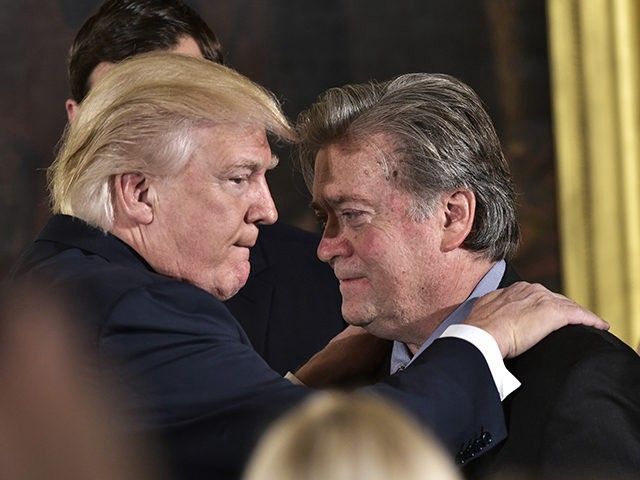
Trump’s chief strategist in the White House, Steve Bannon, is on the board of Cambridge Analytica, which is now actively using its close ties to Trump’s inner circle to pitch for new government contracts.
Michael Flynn — who advised Michael Pregent’s VATD — also served as an advisor to Cambridge Analytica’s parent company, SCL Group, to help expand its contracting work. Under Trump, the firm has just finalized a contract with the State Department’s Global Engagement Center on a new counter-extremism program.
Among the firm’s main financiers is billionaire Robert Mercer, one of Trump’s chief political donors, and previously a key funder for Bannon’s Breitbart News, among other projects.
In 2014, Bannon was the Mercer family’s political advisor, and played a key role in rolling out Cambridge Analytica for the US Republican election scene — precisely when Patten worked there.
In July 2016, the month Patten launched the Committee to Destroy ISIS, Patten was interviewed by Steve Bannon on Breitbart News’ radio show to discuss the Committee’s vision for a partitioned Iraq. Breitbart also published an op-ed by Patten putting forward the same views.
Asked about his relationship with Steve Bannon, and whether he believed the Trump administration might end-up taking on the Committee’s proposals for a break-up of Iraq, Patten said: “One outcome of the US election is the likely change in approach to foreign policy. The new administration includes voices that oppose making America’s regional policy a hostage to a single Gulf nation’s ambition, and has been actively calling for new ideas.”
Patten also heaped praise on the White House chief strategist:
“We met Mr. Bannon last summer and he struck us a thoughtful person, an avid student of history and an original thinker. We hope that new thinking may challenge the cynical, status quo of recent years…”
I asked the US State Department whether it supported the Committee’s position, or still stood by the traditional US position of previous administrations supporting a unified Iraq. A spokesperson sent me an excerpt from Monday’s press briefing, in which an official confirmed that the Trump administration was moving to accommodate the possibility of a divided Iraq:
“With respect to the unity of Iraq, you’re right, that is something we make a point of saying. But ultimately, these are all internal political discussions that Iraq needs to have with all ethnic groups resident in the country.” [emphasis added]
This is the first time that the State Department has officially declared the US government’s willingness to contemplate the prospect of an Iraq break-up of some kind. The reality on the ground is that the process is already underway, but the Trump administration’s position is a major step toward formalising it.
But former Bush PR guru Sam Patten is not just connected to the Trump administration. He simultaneously works with certain Sunni factions in Iraq — some of whom were suspected by US intelligence of having ties to the anti-US insurgency.
Flirting with insurgents
In 2014, as Iraqi writer Ali Hadi al-Musawi reported, Patten separately registered as a foreign agent on behalf of the Sunni-led Al Arabiya bloc, an Iraqi political coalition formed by then-deputy prime minister of Iraq, Saleh al-Mutlaq.
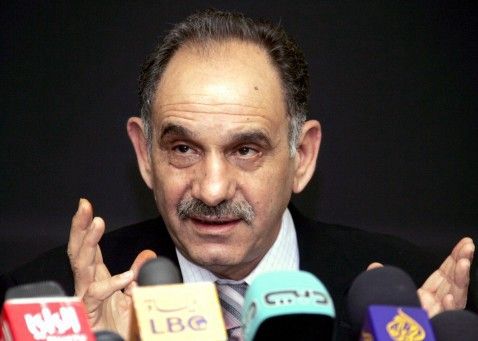
Under Saddam, al-Mutlaq was a member of the Ba’ath Party until the late 1970s when he was expelled for insisting that 5 Shi’ite men should receive a fair trial.
Since then, however, al-Mutlaq unofficially maintained contacts with the Ba’ath Party on many levels, according to Jordanian writer Mohammed Hussainy. Disclosure filings confirm that during this time, Patten was paid from al-Mutlaq’s Jordanian office in Amman.
According to the Daily Beast:
“… some in US intelligence have suspected him [al-Mutlaq] of having ties to Sunni insurgents over the years.”
In January 2007, US forces were reportedly fired on from al-Mutlaq’s office in Baghdad, during a raid on a suspected al-Qaeda safehouse. “One of the buildings from which Coalition Forces received heavy enemy fire, including grenade launches, was later identified as belonging to Dr. Saleh al-Mutlaq,” said a US statement. Al-Mutlaq denied the incident.
On April 17, 2007, al-Mutlaq called for Iraq’s insurgent groups to unite against the US during an interview with Reuters from Amman. He said that insurgents must agree on a future vision of Iraq if the US military did not abruptly pull out of the country.
His rapport with the wider Sunni population is questionable, though. A declassified December 2007 intelligence assessment by the British government’s Joint Intelligence Committee described al-Mutlaq as commanding “little support from the Sunni street.”
But the key point is that Sam Patten didn’t seem particularly concerned by the fact that the US administration he once served suspected al-Mutlaq of siding with the insurgency.
Lobbying for the dynasty
Patten’s loyalties are further revealed from documents he filed in accordance with lobbying regulations.
Congressional filings for the Committee to Destroy ISIS reveal that Patten’s Iraqi benefactors go far beyond al-Mutlaq and the al-Arabiya Coalition, to one of Iraq’s most powerful and wealthiest Sunni clans. The dynasty once maintained friendly relations with Saddam Hussein’s Ba’ath Party, but went on to forge close relations with the US military occupation run by the Bush administration.
The first filing, filed and signed by Patten in August 2016, reveals that the Committee is majority-owned by a foreign entity listed in the disclosure form as “Rhodes Precast Concrete Ltd.” The documents show that Patten is essentially acting as a lobbyist for this “foreign entity.”
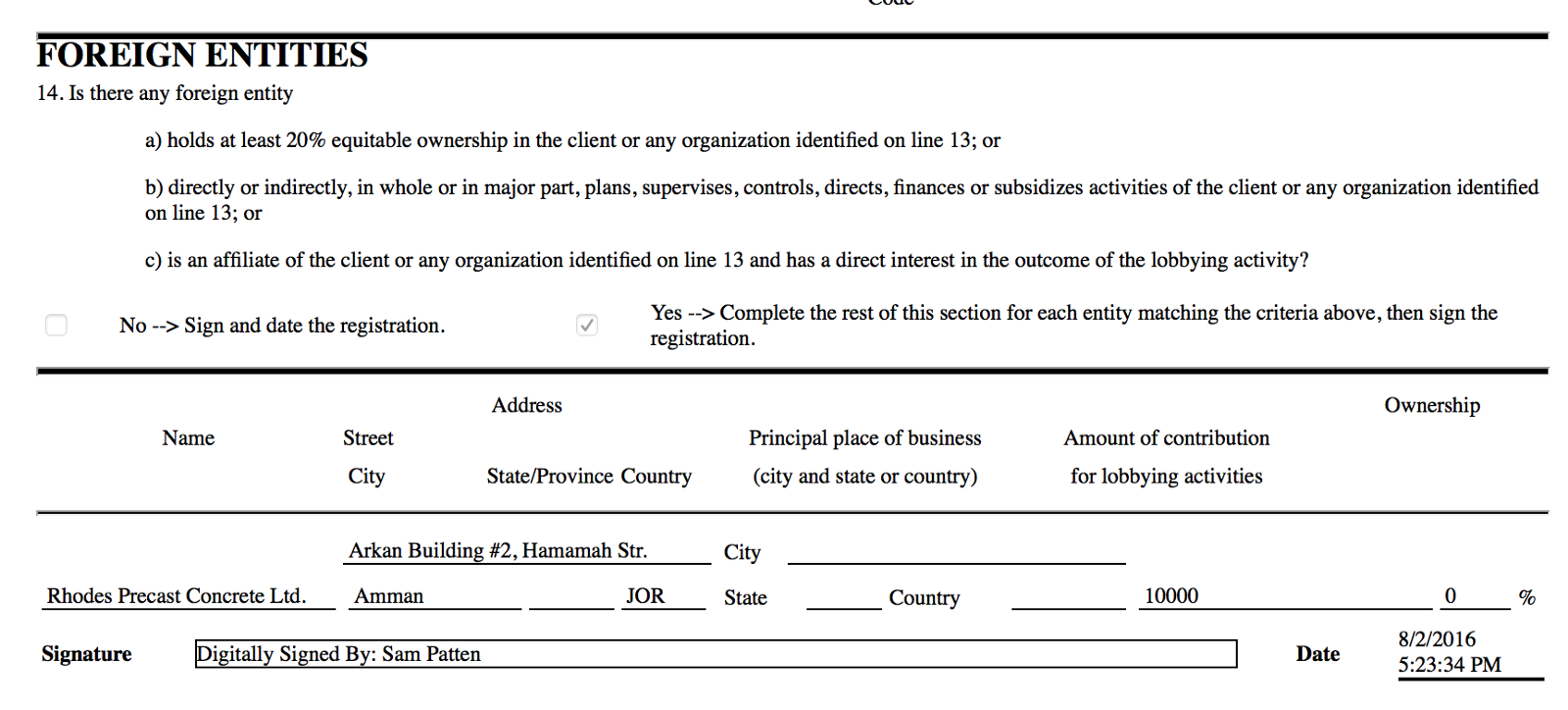
The second document, filed in October 2016, identifies “Rhodes Precast Concrete Co” as a foreign entity interested in lobbying policymakers “about new approaches for stability and security in a post-ISIS Iraq”.
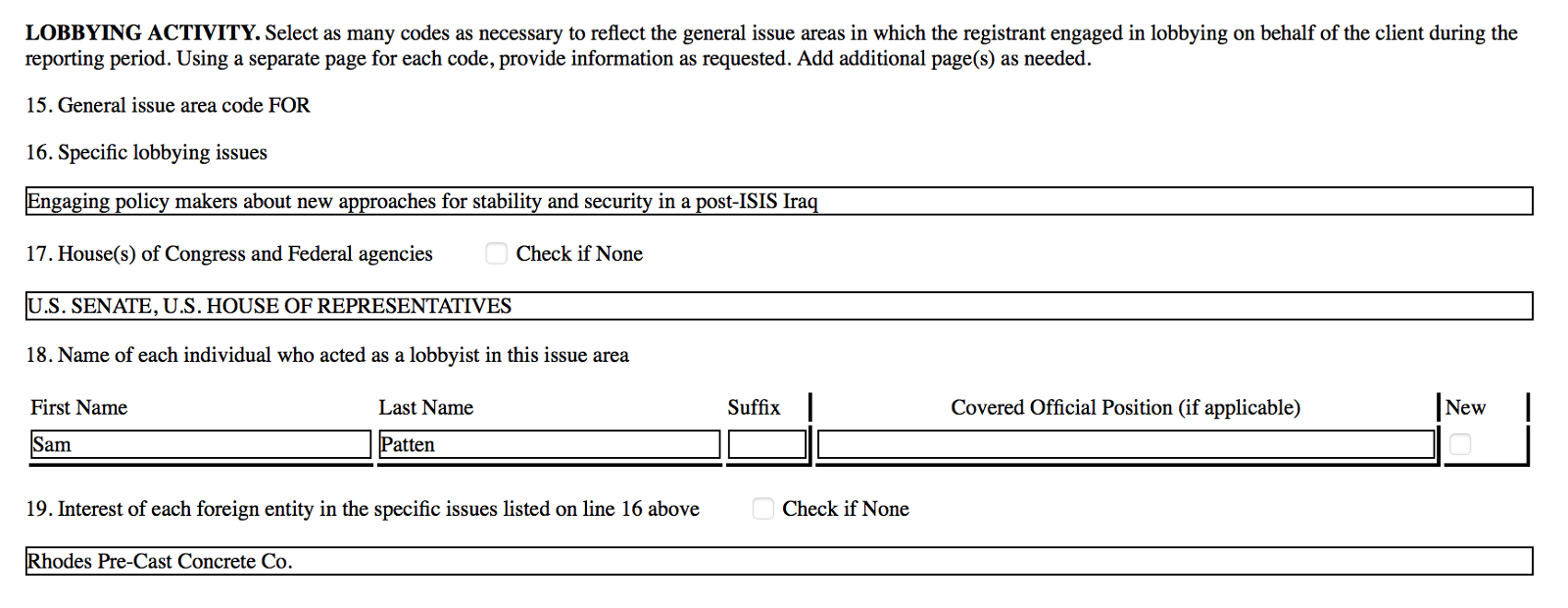
The document also confirms that Patten received income of $50,000 for this lobbying work between July and September 2016.
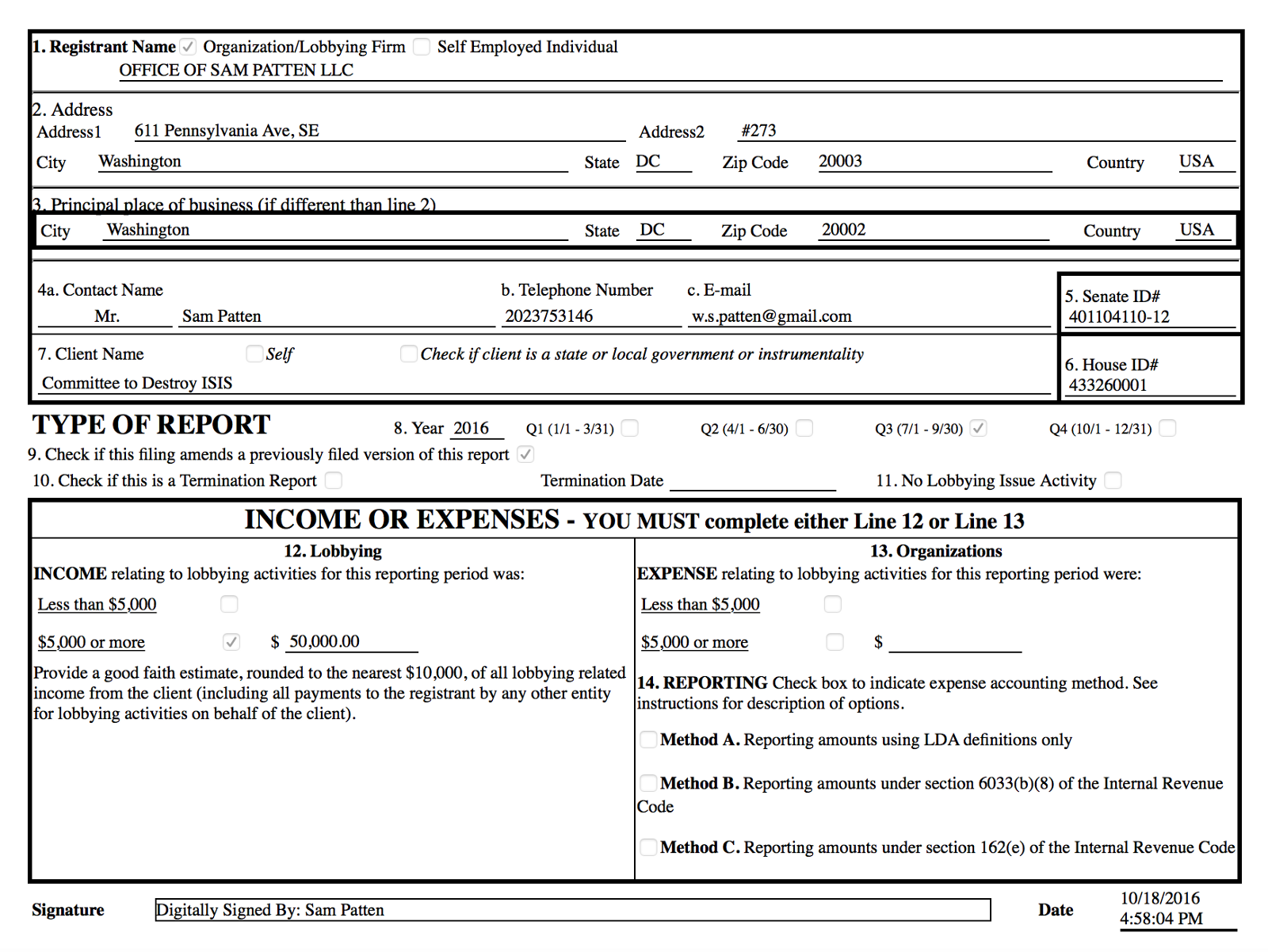
Rhodes Precast Concrete Ltd is an innocuous looking construction firm in Amman, Jordan.
INSURGE intelligence traced ultimate ownership of the company to a little-known figure in Iraq, Faisal Kedairy, who previously acted as a private Pentagon contractor during the post-2003 US occupation of Iraq.
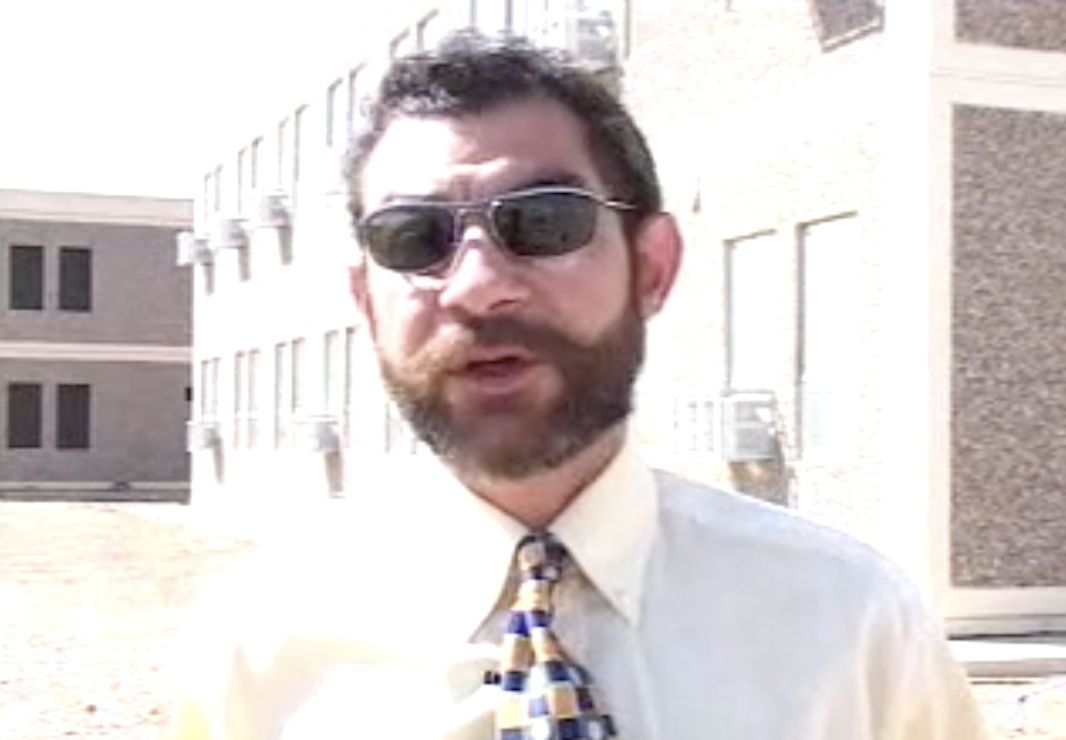
The website for Rhodes Precast Concrete Ltd. is registered in the name of Aoun Naimi, who is the IT services manager for an offshore company, Skychase Ltd.
Skychase Ltd is identified in the Panama Papers among a small interlocking circle of offshore companies registered in Amman, Jordan.
Yet their jurisdiction is incorporated in the British Virgin Islands by the controversial lawfirm Mossack Fonseca, on behalf of their principal owner, Faisal Kedairy.
The network of offshore companies controlled by Kedairy also includes Rhodes Contracting Corp. and Tak Services Assets Limited. All of them have accounts based at Lombard Odier, one of the largest Swiss private banks.
In 2004, as CEO of Kedairy Construction, Faisal Kedairy was contracted by the US coalition authority to renovate the Al-Kasik Military Training Base, west of Mosul, to house the 3rd division of the Iraqi Armed Forces. Data from the US Army Corps of Engineers confirms that the Bush administration had allocated more than $150 million for the project.
At the time, Kedairy also headed up Dhofar, described by the New York Times in 2003 as Iraq’s largest pharmaceutical manufacturer.
The Kedairy family is one of the oldest business families in Iraq, going back to the merchant classes of the eighteenth century. Although not necessarily ideologically pro-Ba’ath, Cairo University political scientist Chérine Chams el Dine explains that the family would have had to actively work with Saddam’s Ba’athist regime:
“… many of the new business elites were connected to senior political figures via family ties, joint business ventures, regional origins, or patronage links. Even those who tried to keep their distance and did not owe their wealth to the regime’s largesse, like the al-Khudhairy family, had to accommodate the regime, as entrepreneurs could not show the slightest sign of opposition and stay in business.”
Much of the Kedairy family business operated in Amman, Jordan, after the UN sanctions regime was imposed in the wake of the 1991 Gulf war. The family holdings encompass a wide array of businesses including construction, engineering, real estate, tourism and banking.
However, Faisal Kedairy himself, who keeps a low profile, is completely unconnected with the better known group of Iraqi companies within the wider family’s holdings, the Khudairi Group. Sources at the Khudairi Group confirmed that despite being very distantly related, the Group and its directors have no business, financial, or even personal ties with Faisal Kedairy or other members of the Kedairy family identified in this story.
Company records indicate that Faisal Kedairy heads up a number of other Iraqi companies: Asad Khudairy Group-Holding, Al Zawraa Financial Investment, Al Nukhba for General Construction and Dar al-Salam for Insurance.
I asked Sam Patten about the use of the Jordanian company, ‘Rhodes Precast Construction Ltd’, as the vehicle for Faisal Kedairy’s lobbying efforts through the Committee to Destroy ISIS. He said:
“One day, this group [ISIS] will be destroyed and the question will immediately be how best to rebuild. Those with an interest in building a better, more prosperous, durable and fair region in the areas ISIS has occupied over the last two and a half years find our message constructive, and have supported us.”
This was, in effect, an open admission that his funders expected to benefit directly from the Committee’s proposed vision of west Iraq breaking away:
ISIS is a scourge on the areas it still occupies, and remains a threat to the world at large. Rebuilding in the wake of its destruction will be a massive task. Iraqi construction firms should have the first opportunity to perform this work — not the Bechtels, KBRs or other multi-national conglomerates. That is one reason why those who look forward to a more equitable, just and peaceful Iraq share an interest in our mission and our work.”
The security racket
The Kedairy family connection opens up a further can of worms related to suspected associations with insurgents.
Among the family’s holdings is a private security firm previously known as Shield Group Security (SGS), owned by Mustafa al Kedairy, which in 2006 changed its name to National Shield Security.
According to court papers and leaked Pentagon documents from the Wikileaks Iraq War Logs, the US government officially believed that SGS was secretly supplying weapons to Sunni insurgents. That was the unclassified justification for detaining and torturing two American whistleblowers who exposed the firm’s involvement in illicit weapons trading, among other matters, in 2006.
Court papers of the complaint reveal that SGS employees Donald Vance and Nathan Ertel had witnessed suspicious activities such as illicit gun-running in relation to Sunni tribal sheikhs, some of whom appear to have been linked to a spate of terrorist violence in Iraq involving beheadings and kidnappings.
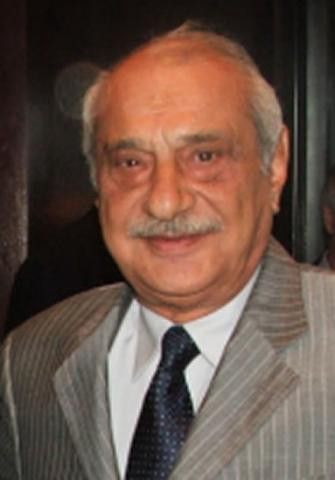
A key figure highlighted in the papers is Laith al Kedairy, Mustafa’s uncle, who met regularly with Sunni tribal sheikhs. The Americans witnessed secretive cash payments to the sheikhs, at least one of whom threatened violence.
Laith al Kedairy is described by the court filings as being “employed by the United States Department of State in detainee operations.”
Laith al Kedairy played a key role as an intermediary between the US military and ex-insurgents in the Anbar province, with a view to recruit them into joining forces with the US against al-Qaeda. Some of them had, however, been al-Qaeda sympathizers who had previously fought alongside the terror group. At one point, Laith worked as an advisor to US Generals John Allen and John Kelly in their tours in Anbar.
Vance and Ertel’s court complaint notes that the two SGS employees had “observed payments being made by SGS agents to certain Iraqi sheikhs… to obtain influence.”
Laith would regularly “come to the SGS compound and meet large groups of sheikhs.” SGS would often “shut down the entire floor on which the meeting was being held” to keep them secret: “… the sheikhs helped bring SGS contracts and demanded jobs for their tribes and, apparently, cash in return… the sheikhs would attend SGS business development meetings” where they would demand “more contracts”:
“At one point during the highly-publicized spate of abductions and beheadings in Iraq, Sheik Abu Bakir made a threat in front of Mustafa that he would have Plaintiffs [the whistleblowers] kidnapped if they did not obtain more contracts.”
This and other incriminating information was passed on by Vance and Ertel to the FBI, State Department and other federal officials — but instead of moving against SGS, their whistleblowing “triggered retaliation by their own government.”
US officials with vested interests in the SGS’ operations wanted to shut down the whistleblowing and find out how much the American contractors actually knew. The result was that Vance and Ertel were detained by SGS at Mustafa al Kedairy’s orders, and handed over to the US coalition authority in Iraq. They ended up being tortured in Camp Cropper.
The episode is summarized in the opening of a Court of Appeals filing which states:
“Vance came to suspect that Shield was supplying weapons to groups opposed to the United States. He reported his observations to the FBI. Ertel furnished some of the information that Vance relayed. Persons who Vance and Ertel suspected of gun-running retaliated by accusing Vance and Ertel of being arms dealers themselves.”
Pentagon documents filed as part of the court proceedings confirm this narrative, and lend credence to the idea that the Bush administration’s official position on SGS at the time was that the firm was implicated in covertly supporting Iraqi insurgents.
Letters to Vance and Ertel from Lt. Col. Bradley J. Huestis of the US Multinational Force in Iraq’s Detainee Status Board, dated April 20, 2006, stated that SGS was:
“… suspected of supplying weapons and explosives to insurgent/criminal groups… Credible evidence suggests that certain members of SGS are supplying weapons to insurgent groups in Iraq.”

The documents describe this as the “unclassified factual basis” used by the Board to determine the status of the whistleblowers.
Similarly, a Magistrate Form for Ertel’s detention at Camp Cropper in Baghdad, Iraq, from the Department of Defense’s Legal Office — Task Force 134, dated April 22, 2006, described SGS as a “business entity” harboring a large cache of weapons that “may be involved in the possible distribution of these weapons to insurgent/terrorist groups.”

These documents asserted that Vance and Ertel were suspects in the illegal weapons supply. Yet while it was eventually admitted after their release that both Vance and Ertel were innocent, the US government never withdrew the allegation of holding “credible evidence” on the Kedairy family’s private security firm gun-running for insurgents.
If correct, this raises unnerving questions about the reasons behind the ultimate failure of the ‘Awakening’ — the US effort to mobilize ex-insurgents against al-Qaeda in Iraq, the precursor to ISIS.
If the SGS was, as suspected by the US government (and Vance and Ertel), supplying weapons to Sunni insurgents in an effort to co-opt them into supporting US forces, this might partly explain why the ‘Awakening’ precipitated AQI’s metamorphosis into ISIS in the long-run.
The Committee to Destroy ISIS, then — along with its vigorous call for a breakaway Sunni statelet in west Iraq — is little more than a lobbying front for members of a Ba’ath-era Iraqi dynasty, some of whom the Pentagon suspected of arming the very insurgency from which ISIS was eventually born.
Whitewashing al-Qaeda, siding with ISIS
This is not the only dubious connection between the Committee and America’s official enemies.
Through 2014, the lead author of the Committee’s policy report promoting an Iraq break-up — Michael Pregent — co-wrote a series of articles heavily promoting US support for the Free Syrian Army (FSA) as a bulwark against both ISIS and al-Qaeda.
While the FSA consists of a multiplicity of Islamist and secular rebel groups, Gulf state and Turkish funding increasingly empowered more virulent jihadist elements in the FSA, lending them the ability to dominate the rebel movement.
As Algemeiner reported, earlier that year numerous FSA Supreme Military Council officials had expressed support for al-Qaeda’s Syrian franchise, and had their brigades fight alongside the group. One FSA leader admitted that they and al-Qaeda were operating joint “military operations rooms”. To this day, the FSA’s relationship with Islamist groups remains complicated, with instances of collaboration and other instances of conflict.
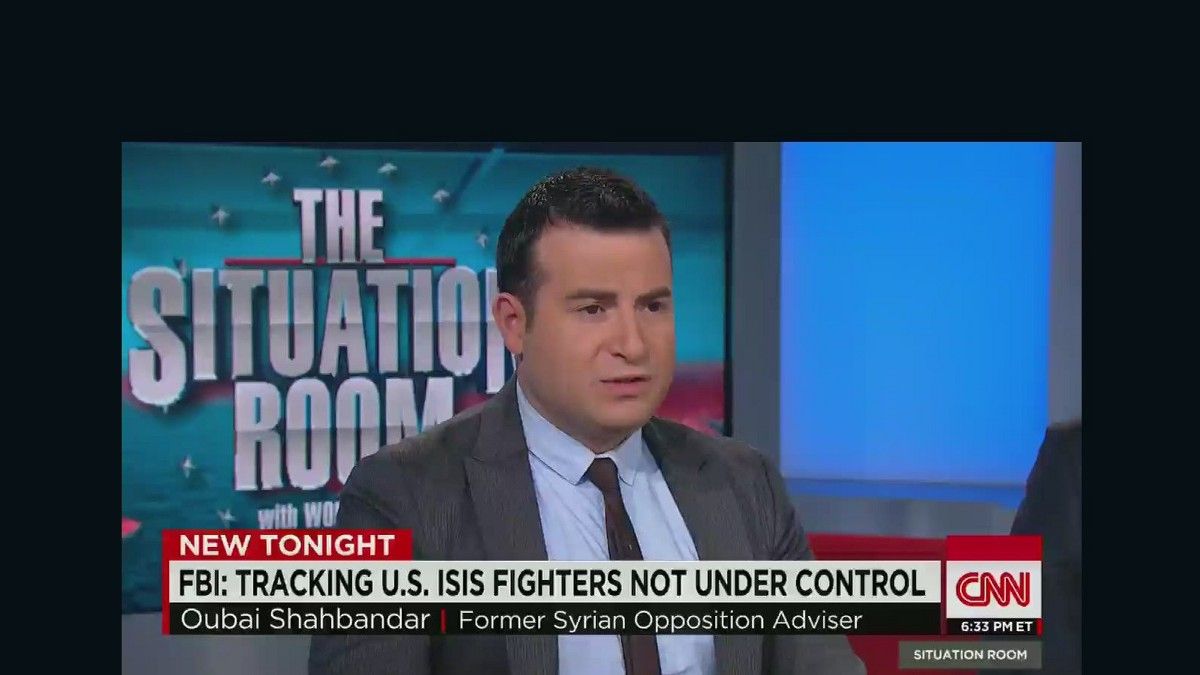
None of this deterred Pregent or his co-writer at the time, Oubai Shahbander — then a strategic communications advisor to the Syrian National Coalition, the main opposition umbrella group.
In this capacity, Shahbander was directly involved in US efforts to supply weapons to the FSA as Vice President of Middle East Operations at the Syria Support Group (SSG).
The US government’s financial support for the FSA went through the SSG, incorporated in Washington DC in April 2012. The SSG was licensed via the Treasury Department to “export, re-export, sell, or supply to the Free Syrian Army (‘FSA’) financial, communications, logistical, and other services otherwise prohibited by Executive Order 13582 in order to support the FSA.”
There was a stark gap between the SSG’s propaganda, and the reality of its fraught interpenetration with Islamist extremists. While the SSG estimated that only 10–15% of the FSA were affiliated to al-Qaeda, in contrast Pentagon officials estimated that “more than 50%” of the FSA comprised of Islamist extremists.
Shahbander worked as a Pentagon foreign affairs officer from 2005 to 2013. But by the time he began producing articles with Pregent promoting US military support for the FSA, he had become Principal at an obscure strategic consultancy firm called Dragoman Ventures headquartered in Dubai.
By March 2016, Shahbander went on to join PR giant Qorvis MSL Group as a senior strategic communications advisor, working specifically on the firm’s Saudi Arabia account. A now deleted-section of the firm’s website stated that it “has effectively served to strengthen the 80-year relationship between the Saudi and American people and governments”.
Among the firm’s outputs in the month that Shahbander tookover the Saudi account, was a Newsweek article authored by Saudi foreign minister Adel bin Ahmed al-Jubeir, titled ‘The Saudis Are Fighting Terrorism, Don’t Believe Otherwise’.
Of course, al-Jubeir’s article made no mention of the leaked memo to Hillary Clinton dated August 17, 2014, drawing on “western intelligence, US intelligence and sources in the region” to conclude that:
“… the governments of Qatar and Saudi Arabia… are providing clandestine financial and logistic support to ISIS and other radical groups in the region.”
Pregent’s co-writer Shahbander had moved quickly from playing down Islamist militant efforts to co-opt the FSA, to shilling directly for the very Gulf kingdom secretly sponsoring ISIS.
Unfortunately, Pregent declined to answer any questions at all in relation to this story. “Reword your leading questions and I’ll reconsider”, wrote the former intelligence officer in response to a list of questions.
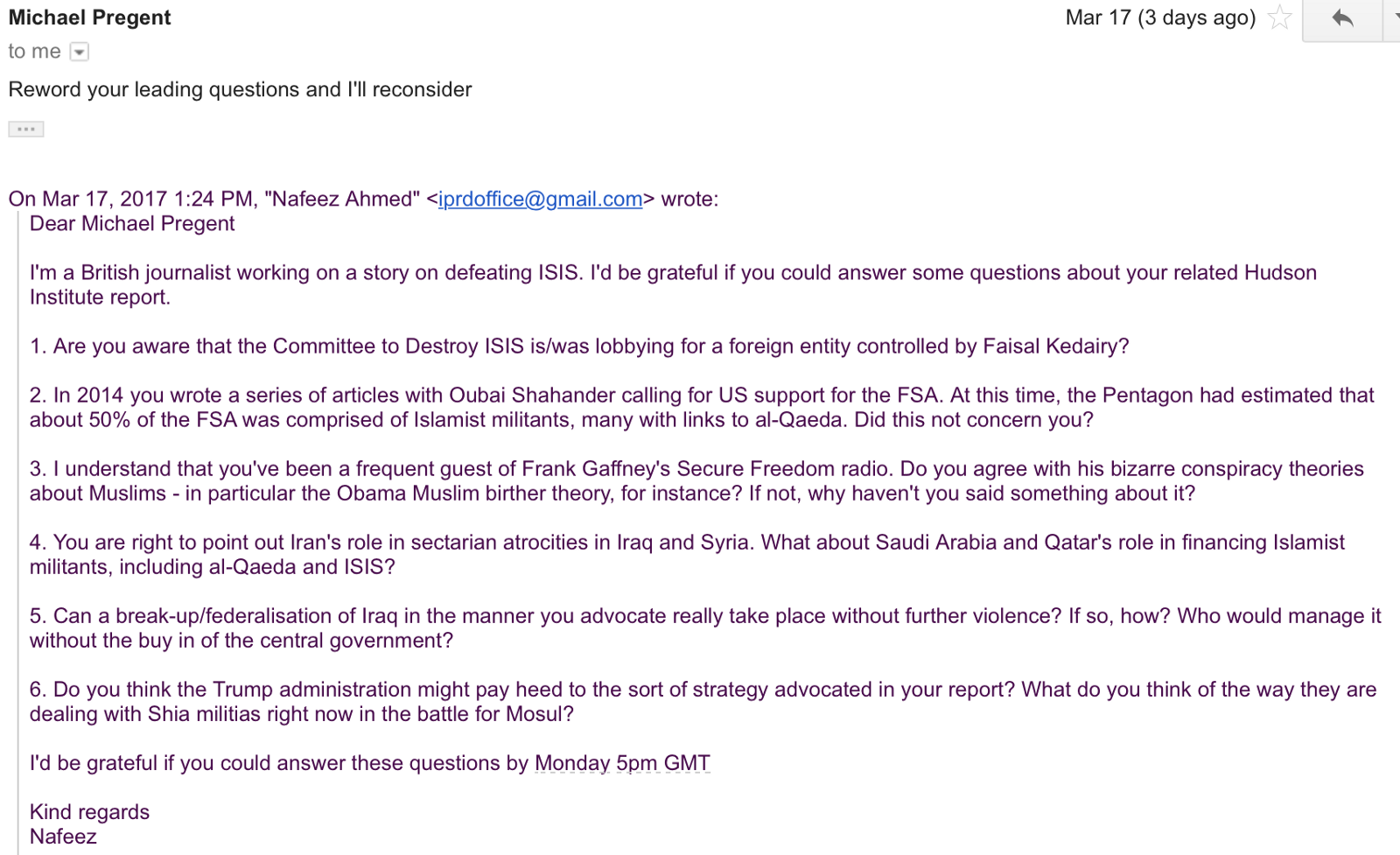
Oil and resources
Meanwhile, Pregent’s 2014 co-writer, Shahbander, remains a Principal at Dragoman Ventures, founded by Ali Khedery, a former US State Department and Pentagon official who served in the US coalition authority in Iraq.
Both Shahbander and Ali Khedery served with General Petraeus on the ‘Awakening’ initiative in Anbar.
Dragoman’s self-professed aim is to serve “international clients as a bridge between East and West, introducing multinational corporations to new markets and new leaders while guiding them through the opaque politics and regulations of the region.”
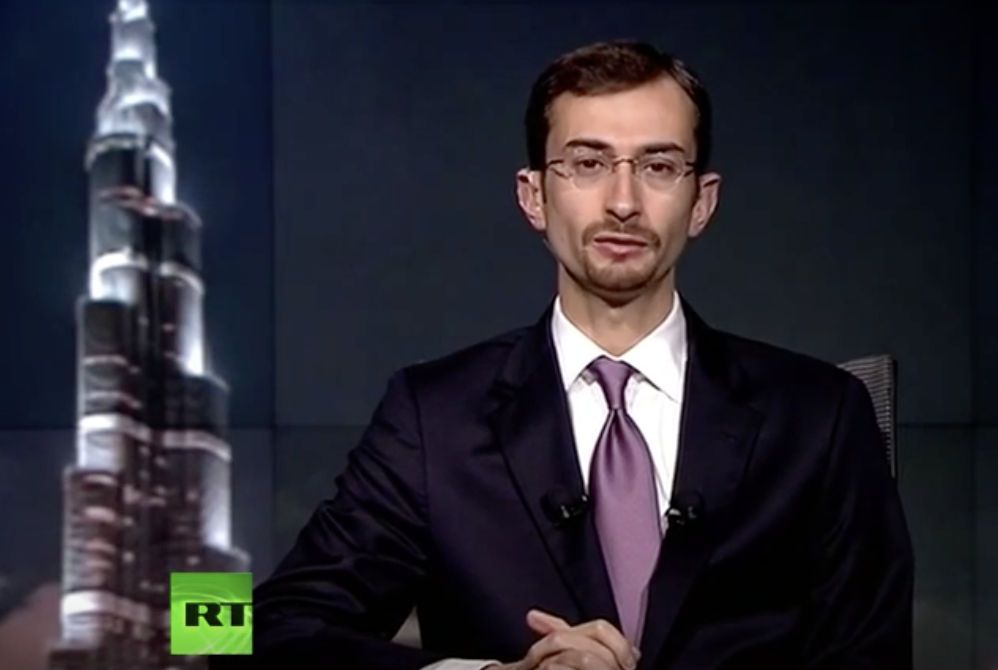
Prior to setting up Dragoman, Khedery left his US government role in Iraq to join ExxonMobil from 2011 to 2012. There he advised then-CEO Rex Tillerson — now Trump’s Secretary of State — on Iraq’s country strategy.
One of his instrumental pieces of advice was to urge the oil major to move unilaterally into the Kurdistan region of Iraq to forge a direct oil deal, bypassing the central government. The idea was to offset deteriorating profits from increasingly problematic oil contracts with the central government over fields in southern Iraq.
The move was partly motivated due to estimates of unexplored oil reserves in northern Iraq, which an internal assessment described as “one of the world’s most promising regions for the future [of] hydrocarbon discovery” — carrying as much as 55 billion untapped barrels.
The move saw ExxonMobil siding with the Kurdish Regional Government’s (KRG) efforts to cement its autonomy from the central government: step one in the break-up of Iraq.
It turns out that former ExxonMobil executive Ali Khedery was also enrolled in the Committee to Destroy ISIS’ PR blitz promoting the partitioning of Iraq as the ultimate solution to the ongoing conflict.
The Committee’s ‘Press Center’ highlights Khedery’s article in the December 2015 issue of Foreign Affairs, ‘Iraq in Pieces: Breaking Up to Stay Together’, calling for the “self-determination” of the western Sunni portion of Iraq.

But perhaps more revealingly, Michael Pregent’s Hudson Institute report flags up the oil potential of the western Iraqi region. While noting that proven reserves are modest, he adds:
“Western experts speculated in 2007 that as much as 100 billion barrels in oil may exist in deep formations in the Anbar Province, but political and security conditions have limited follow-up.” [emphasis added]
The 100 billion barrel estimate of oil in Anbar is double ExxonMobil’s preliminary assessment of oil reserves in Iraqi Kurdistan, before the firm decided to move unilaterally into that region.
The estimate was released in early 2007 by giant energy consultancy IHS (now IHS CERA). “Until now, Sunni politicians have feared economic devastation if Iraq divided into a federation or imploded into disparate ethnic states, since the territory dominated by their ethnic group was thought to be the only one without large reserves of oil,” observed TIME magazine.
Senior US military officials operating in Anbar at the time, including Gen John Allen who worked with SGS’ Laith al Kedairy, were fully aware of the findings.
Other fields, Pregent observed, “such as the Najma and al-Qayara fields, for example, south of Mosul in the Ninewa Province each contain an estimated 800 million barrels of oil.”
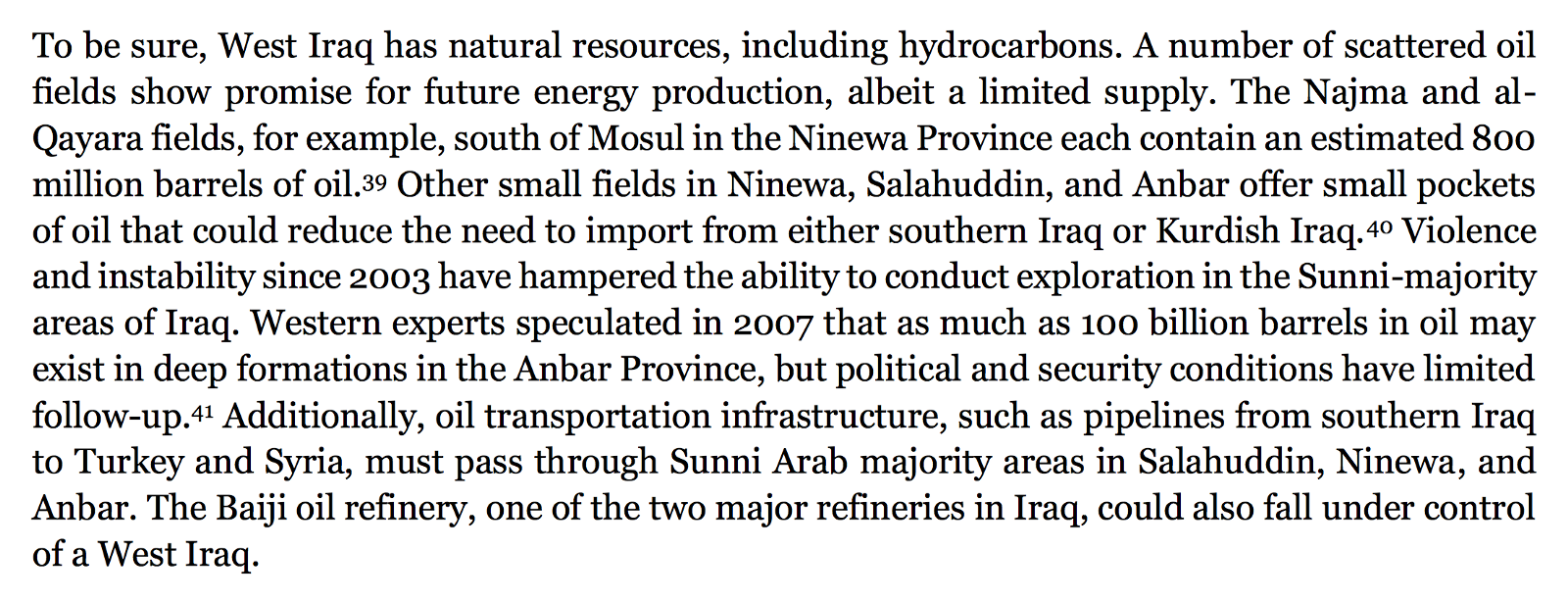
West Iraq is also a potential bonanza for natural gas and phosphates, according to Pregent.
The Akkas field’s 5.6 trillion cubic feet of natural gas, wrote Pregent, could produce the equivalent of 100,000 barrels of oil a day, which might be used to supply Europe and wean the continent off dependence on Russian energy imports. Nearby Anbar — which lies at the heart of the insurgency — contains nearly a tenth of the world’s total phosphates deposits.
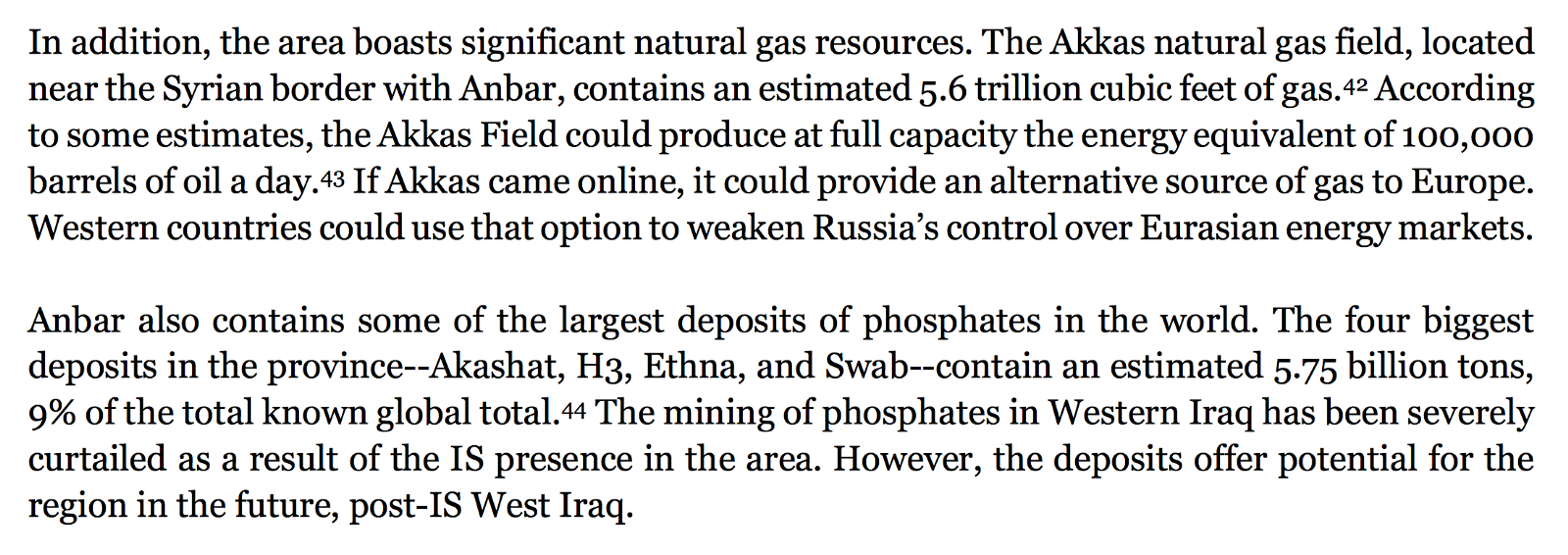
The region’s untapped phosphate supply comes at a fortuitous moment. As Bangor University chemist Vera Thoss explained in March, more than 70% of the world’s phosphorous supply used for fertilizers comes from phosphate rocks concentrated in the Western Sahara in Morocco. Yet some scientists believe that the world may be nearing a point where demand begins to outstrip supply, which could undermine crop yields from global agribusiness.
It so happens that through Koch Fertilizer Inc., the Koch brothers, who fund organizations associated with the Committee to Destroy ISIS, is now the world’s largest producer of nitrogen fertilizer, which relies heavily on phosphate supplies.
Despite the Koch brothers’ stated opposition to some of Trump’s policies — such as his immigration ban — fully one-third of his transition team had Koch ties.
Only time will tell the full extent to which the Trump administration bows to these lobbying efforts from former Bush officials and Iraqi elites tied to Cambridge Analytica, Islamist insurgents, ExxonMobil and the Koch brothers. But for the first time, the State Department has opened the possibility of a dissolution of Iraq based on ‘internal’ discussions in the country.
The problem is that such discussions are not just ‘internal’. Efforts to manipulate public opinion to actively engineer Iraq’s dissolution are being pursued by a coterie of defunct American neoconservatives and Ba’athist era Iraqi elites who hide their vast wealth in Swiss banks.
And it’s far from clear that such an outcome would be designed to benefit Iraqis on the ground, as opposed to the corporate interests of a small nexus of pro-Trump US and Iraqi elites.
This article was amended on March 23, 2017 to acknowledge that Ali Hadi al-Musawi of 1001IraqiThoughts first reported on links between Patten, the Hudson Institute, and Saleh Mutlaq in October 2016, and to add clarity on the strategic background of US thinking on a partitioning of Iraq.
This article was amended on December 4, 2017 to remove statements incorrectly stating that Faisal Kedairy is connected with the Khudairi Group. Kedairy has no relevant connections with the Khudairi Group. An Alternet reprint of this article was corrected earlier in the same fashion on July 27, 2017.



